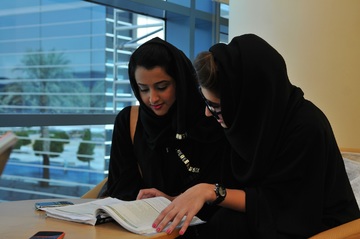Around the globe, more than 420 million people speak Arabic. Over 20 countries and intergovernmental organizations, including the United Nations, have Arabic as their official working language, while many other countries consider Arabic a working language. Like any language, learning Arabic has its challenges, such as many dialects, difficulty in grammar, and speech exposure. As U.N. Arabic Language Day approaches on Dec. 18, the following three reasons will not only inform you, but encourage you to consider learning Arabic in 2018.
- Potential Business In May 2017, President Trump’s first trip in office was to Saudi Arabia. He was accompanied by prominent businesses leaders from companies like JPMorgan Chase, Morgan Stanley, and Dow Chemical. The leaders spoke on the 2030 Vision plan to enhance business deals around the globe. On a smaller scale, companies like Amazon work with businesses looking to expand beyond Middle Eastern borders. We see this with the CEO and cofounder of Souq, Ronald Mouchawar, who explains that these businesses need to expand with a larger name to grow. In Harvard Business Review, Mouchawar encourages business professionals to learn Arabic as the preferred language of Arab customers. As companies collaborate across different specialties and regions, eliminating the language barrier can change the game.
- Create A Community This past year, Pew Research found that most refugees entering the U.S. speak Arabic because most families come from Middle Eastern and North African regions. Some travel to the U.S. speaking some English, while others don’t. Programs like the Refugee Student Mentor Program at the University of Texas at Austin send students who are learning Arabic into schools to help children transition into daily life in a new country. Programs like Natakallam (نتكام, meaning “we talk”) rely on native-Arabic speakers to communicate with refugees speaking different dialects to help the transition into a new country. Individuals who are willing to create an intercultural bridge are able help newcomers feel welcomed.
- Uniqueness For 10 years, the International Prize for Arabic Fiction has had the honor of choosing a few select authors each year and publishing their novels in different languages worldwide. Each authors’ works are translated free of charge to promote literature globally, and encourage Arab writers to continue their passions. However, a few authors view this as a negative practice due to lost messages during translation and sensationalized stereotypes. While some academic scholars around the globe, and at the University of Texas are aware of such stereotypes, some believe these are essential to studying activist literature and connecting other regions. Arabic often has a poetic feel and learning the language will shine light on its beauty.
While some consider Arabic a political language, it’s essential for individuals moving to new countries and creating businesses in the Middle East. Some believe the language will help guarantee a job, and others affirm it’s one of the high demand languages. Anyone looking to expand their cultural knowledge and business in the Middle East may benefit from to learning Arabic.
Sharon Schweitzer and Esther Sanchez co-wrote this post. Sharon Schweitzer, J.D., is an award-winning entrepreneur, cross-cultural trainer, and the founder of Access to Culture. In addition to her accreditation in intercultural management from the HOFSTEDE Centre, she serves as a Chinese Ceremonial Dining Etiquette Specialist in the documentary series Confucius was a Foodie, onNat Geo People. She is regularly quoted by BBC Capital, Investor’s Business Daily, and Fortune. Her Amazon #1 Best Selling book in International Business, Access to Asia: Your Multicultural Business Guide, (3rd printing), was named to Kirkus Reviews’ Best Books of 2015. She’s a winner of the British Airways International Trade Award at the 2016 Greater Austin Business Awards.
Esther Sanchez is a Fall 2017 Cross-Cultural Communication intern with Access to Culture. She is currently attending the University of Texas at Austin as a Journalism major and working to earn a minor in Middle Eastern Studies and a certificate in Computer Science. She plans to use these skills to tell stories through virtual reality from around the world. You can connect with her onLinkedIn or Facebook, Instagram or Twitter.
Photo credit: Pxhere


Thanks for writing this post on our mother tongue.